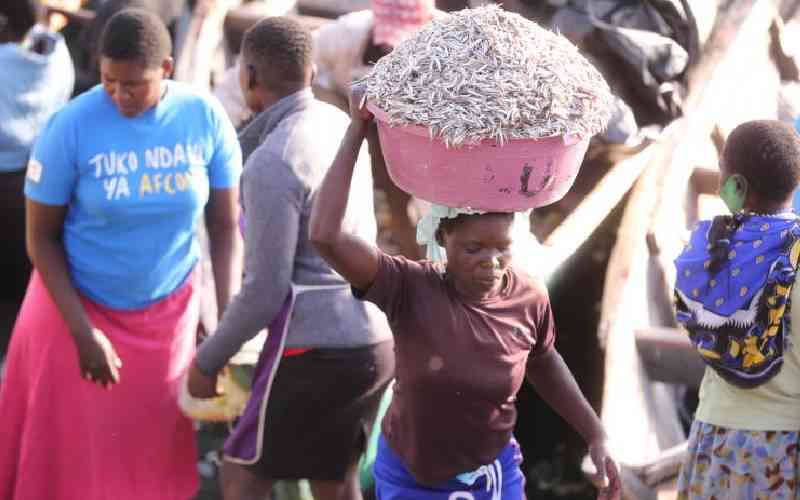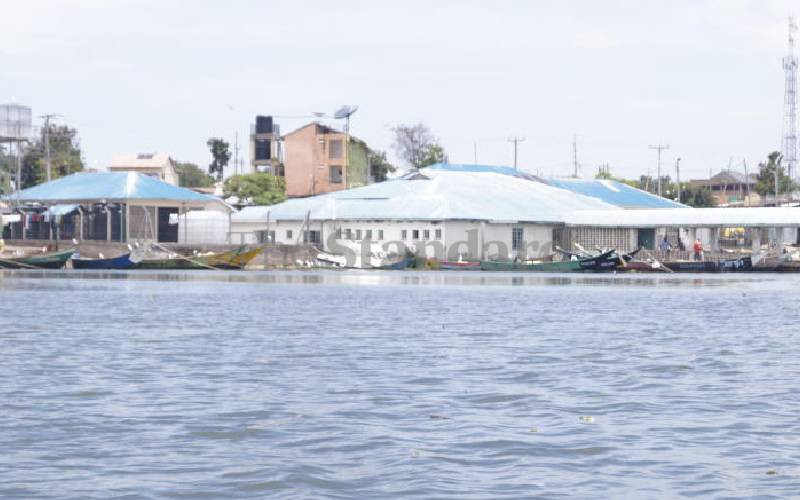Strolling along the lonely edges of Lwang’ni Beach on Friday morning, Mr Dalmas Otieno makes a measured dash towards our crew, hoping to get some business for his Lakeside Adventure Tours – a boat riding venture.
A measured dash because in my village they say he who races against himself is as fast as a neutered dog. Otieno is the only boat operator on duty this early. And his dash is informed by a deep-seated bitterness. And for a good reason.
“Afadhali hata hawangekuja sababu hatukuona manufaa. They were only interested in eating fish and dancing the nights away in clubs. They totally ignored our entreaties to sample a boat ride,” he angrily exclaims, his bitterness compounded by realisation that our crew won’t take a ride either.
Otieno was talking about the approximately 5,000 delegates at the Second National Devolution Conference at the Tom Mboya Labour College, Kisumu. Throughout the four days of the conference, delegates flocked to Lwang’ni beach for fish.
The fishmongers in Lwang’ni, basking in the early morning rays next to Otieno’s forsaken boat, have a different story.
"We wish it went on and on. Our fish sales more than doubled. We were selling over 100 fish in a single day and not a single fish cost less than Sh1,000. We sold as high as Sh3,000 per fish depending on size,” says Mariam Awuor of Baraka Motel.
In Lwang’ni, all the fish stalls, especially modern ones like Baraka, are motels not hotels. The motels, dazzling in a bright colours and spiral staircases leading to elevated sitting space for better view of the lake, are slowly replacing the traditional semi-permanent mabati structures.
“Walikuwa wanafagia yote mpaka ‘engine’ (they used to eat all the fish including the head)” says Awuor in response to a question on the general fish-eating skills of the devolution visitors.
Emily Odhiambo’s Beach Hotel is your typical Lwang’ni joint; made of soot-coated iron sheets. But she too did good business in the four days. She sold a daily average of 50 fish compared to the 20 or so fish she sells in an ordinary day.
For the devolution visitors, the minimum price per fish was Sh600 but sold as high as Sh1,800 per single fish.
She also sold huge volumes of beer and admits that she often ran out of stock.
“It’s a sad day for us today because all those prices will have to drop and the number of customers will also drop drastically. We will now have to wait for our usual high seasons of Easter and Christmas,” she says.
Eating well
Her friend Akinyi is however celebrating something else: “I am glad none of them choked in our stall. They were eating well. Kumaliza nayo ndio hawajui kumaliza,” she says with a light chuckle.
Emily easily concedes that the modern motels adjacent to her stall – Baraka and Riziki – are threatening to run her out of town. She attributes her losses to ignorance of customers but promises to style up.
Stay informed. Subscribe to our newsletter
“Samaki ni ile ile (it’s the same fish). The fish I was selling for Sh1500, they were selling for Sh3,000. You can’t blame them really, because customers prefer their place. We have all come from far if you have been to Lwang’ni before. We used to have grass-thatched stalls and papyri and reeds seats. We are evolving,” she says.
Cynthia Rose, whose stall is adjacent to Emily’s, was beaming with joy when we found her swaying to the beats of sharp Ohangla tunes from a car being cleaned at the beach. She was not aware the conference had ended the day before and visitors were trooping back to Nairobi.
“Now we want teachers to come. They are always going to Mombasa yet we can host them. Go ask them if we can host the President and the Governors, who are they?” she exclaims, almost drooling in unmistakable excitement.
“Didn’t you see how ‘Ouru’ (President Uhuru Kenyatta) was excited when he was leaving Kisumu? He clasped his hands in satisfaction all through as we escorted him out of our great city. In fact, we want him to visit Lwang’ni the next time he comes around,” she says, demonstrating the President’s gait and punchy handshakes. She was selling about 40 fish a day for the four days. She also packed many more for visitors who had placed take-away orders with her for the last day.
Back to Otieno, the boat man:“Why should a man live on fish alone? Hata Yesu alikataa hiyo maneno. We want to tell them when they come again, we will expect them to take a boat ride. Our charges are modest and the experience, unlike the taste of the fish, is celestial.”
We left him longing for the primary schools drama and music festivals to be staged in Kisumu because in his words, kids are more receptive to boat rides than the adult devolution visitors.
For all its fame, Lwang’ni beach does not have fish of its own. They are brought in by lorries from the Busia side of the lake. We were told fish (in Kisumu, fish is Tilapia) “disappeared” from Lwang’ni.
When the lorries deliver fish, the drive into the waters of Lwang’ni beach to be cleaned. And with every lorry and car and motorbike being cleaned at the beach, the fish swim farther away from Lwang’ni; indeed farther away from Kisumu.
 The Standard Group Plc is a
multi-media organization with investments in media platforms spanning newspaper
print operations, television, radio broadcasting, digital and online services. The
Standard Group is recognized as a leading multi-media house in Kenya with a key
influence in matters of national and international interest.
The Standard Group Plc is a
multi-media organization with investments in media platforms spanning newspaper
print operations, television, radio broadcasting, digital and online services. The
Standard Group is recognized as a leading multi-media house in Kenya with a key
influence in matters of national and international interest.
 The Standard Group Plc is a
multi-media organization with investments in media platforms spanning newspaper
print operations, television, radio broadcasting, digital and online services. The
Standard Group is recognized as a leading multi-media house in Kenya with a key
influence in matters of national and international interest.
The Standard Group Plc is a
multi-media organization with investments in media platforms spanning newspaper
print operations, television, radio broadcasting, digital and online services. The
Standard Group is recognized as a leading multi-media house in Kenya with a key
influence in matters of national and international interest.








